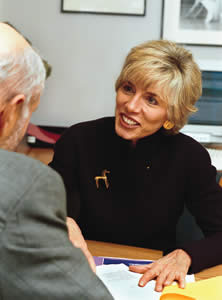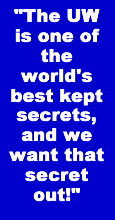 THE UNIVERSITY OF WASHINGTON ALUMNI MAGAZINE
THE UNIVERSITY OF WASHINGTON ALUMNI MAGAZINE
 THE UNIVERSITY OF WASHINGTON ALUMNI MAGAZINE
THE UNIVERSITY OF WASHINGTON ALUMNI MAGAZINE
|
BriefingsWith State Funding Threatened, Private Giving is Crucial, Says New VP
What does a vice president for development and alumni relations do? Isn't it all about fund-raising? Fundamentally, everyone who does this kind of work facilitates relationships between the University and its alumni and friends. Together, we're providing ways for "outsiders" to become "insiders"-making it possible for alumni and friends to become involved and excited about the UW in ways that are personally meaningful to them. The UW had a record year in private gifts and grants last year. How does the UW compare to other universities? Last year, donors gave a record $232 million in private gifts and grants, which puts us second in the nation among all public universities and 15th for both private and public schools. And here's another eye-opener: for 1999-2000, the UW was 38th among all non-profits in the country in terms of donations. As a newcomer to the Husky family, I'm awed by the loyalty of the many thousands of philanthropic stakeholders who support the University. Those are impressive numbers. You must be proud of the record here. What's impressive are the individuals, corporations and foundations who believe in this University, appreciate its excellence and are dedicated to education. And I'm also proud of the institution's values. When I came here, President Dick McCormick and other leaders told me something I found inspiring: "We don't want to raise money just to create a better University of Washington, as noble as that might be. We want to build a stronger, more capable community, a healthier, more prosperous state and a safer, better world." That commitment is something I see in action every day here.  Constance Kravas. Photo by Mary Levin.Give me an example of how private support changes people's lives. Thanks to the extraordinary generosity of our donors, there is incredible effort to find a treatment for muscular dystrophy, a so far incurable disease; to discover ways to predict earthquakes and save lives when they do occur; and to create sustainable communities for Native Americans and migrant workers. There are examples from literally every school, college and unit on campus. Amazing discoveries are occurring right now at the UW that are going to touch all of our lives in positive ways. Another number we see is alumni participation rates. What is our rate and how does it compare to other universities? Last year our rate of alumni participation was 14.6 percent. That puts us in the top three-quarters of our peer universities. I believe we can do even better. There isn't one alum I've met since I started who hasn't looked back on his or her years at the UW with obvious affection and pride. Our goal is to work with our schools, colleges, athletics and other units to do an even better job of staying connected with our alumni and other friends. Their advocacy and support are vital. How large is the UW endowment and how does it rank compared to other universities? It's about $1 billion-a combination of named endowments and other funds. And it is very well managed. Our performance consistently is in the top quartile for all universities. Having said that, it's essential that we encourage donors to consider creating new endowments or adding to their existing ones. These are the investments that literally "keep giving forever." With all that money, why do you have to keep asking for more? Only 15 percent of UW annual expenditures comes from the state of Washington. National trends suggest that public universities can expect even fewer state dollars in the future, as there are many needs competing for limited financial resources. And, of course, when the economy suffers, there is less state support for everything. That's why the UW is evolving as an "entrepreneurial public university" and becoming even stronger at partnering with the private as well as public sector. We've got to make sure that qualified students aren't locked out because of an inability to pay, and that the extraordinary teaching and research that go on here every day continue. How has the recession affected giving to the University? What do you see happening in the short and long term? Despite what's happening at the moment, one fact is encouraging. Americans give what amounts to 2 percent of the gross national product to charitable causes every year, even in severe economic times. Since Sept. 11, Americans seem to want to support charitable organizations that have deep meaning for them and are closer to home. We are seeing that here. Our trends in annual giving and participation remain very strong. Why do you think this is happening when other charitable causes are reporting a downturn in giving? The UW really matters to people. There was a saying created years ago by [former UWAA President] Don Kraft-"The University of Washington: You're getting something out of it whether you go there or not." That saying is still true today, probably even more so. In the medical field alone, think of the countless lives being saved every year because of the UW. Before coming to the UW, you were at the University of California, Riverside, for two years. Why did you decide to leave that position and come here? It was a very difficult decision and Gus [her husband] and I did not make it lightly. But this was a once-in-a-lifetime opportunity to contribute, in a very modest way, to an institution that is at the very forefront of higher education. And the Pacific Northwest is home to us. This is where we want to make a difference if we can. Now that you have been here for five months, what challenges do you see ahead?  One of the biggest challenges is to make sure that we continue to engage our alumni and friends and be relevant to them throughout their lives. The alumni association is starting new programs to do this, like providing career help to recent and not-so-recent grads. And our schools and colleges are looking at how to give our alums continuing education and intellectual experiences similar to what they had when they were students. Maybe the biggest challenge, though, is getting the word out about what's happening here. With [Genome Sciences Professor] Lee Hartwell's award last October, we now have eight UW Nobel laureates-five faculty and three alumni. In the past two years we've had two Rhodes Scholars. I've sensed that many people do not know about these and so many other UW achievements and contributions to society. The University of Washington is one of the world's best kept secrets, and we want that secret out! You helped start the development program at WSU. What did you learn in that process that you can bring to your new position? I learned that development isn't about raising money, it's about creating lasting partnerships. Every day, I see signs of the generosity of people who don't have to donate their money, or give their time, or have any connection with the University. And we can never take that involvement for granted. We have to continue to reach out, to listen and to do the work that they find so important and so worthy of their contributions. Some alumni might doubt that someone with a WSU degree-and who worked for her alma mater for 27 years-can raise millions of dollars for the Huskies. Can a Cougar really change its stripes? You have no idea what a great belly laugh your question is going to bring to our Cougar friends. Cougars don't have stripes! There's a Cougar-Husky joke in the making here. I suppose you won't let me dodge your question entirely, will you? One of the things that has been so reassuring to Gus and me is the gentle humor with which both Cougars and Huskies have treated this whole thing. While the Apple Cup surely is one of the country's great cross-state rivalries, the truth of the matter is that the state of Washington is blessed by outstanding institutions of higher education, public and private, including two extraordinary research universities that do so much to improve the quality of life for the people who live here and complement each other so well. We all have a stake in making higher education in the state of Washington all it can be. Any last remarks you have for our alumni? Their belief in, and advocacy for the UW, their pride and support, mean more than I can possibly describe. The tag-line of our alumni association is "Staying Connected Makes a Difference" and we really mean it. We want to bring everyone who's ever had a relationship with this University-or benefits from its presence in our community-into the life of this extraordinary institution. That's enormously important to the future of the UW and our region.
|